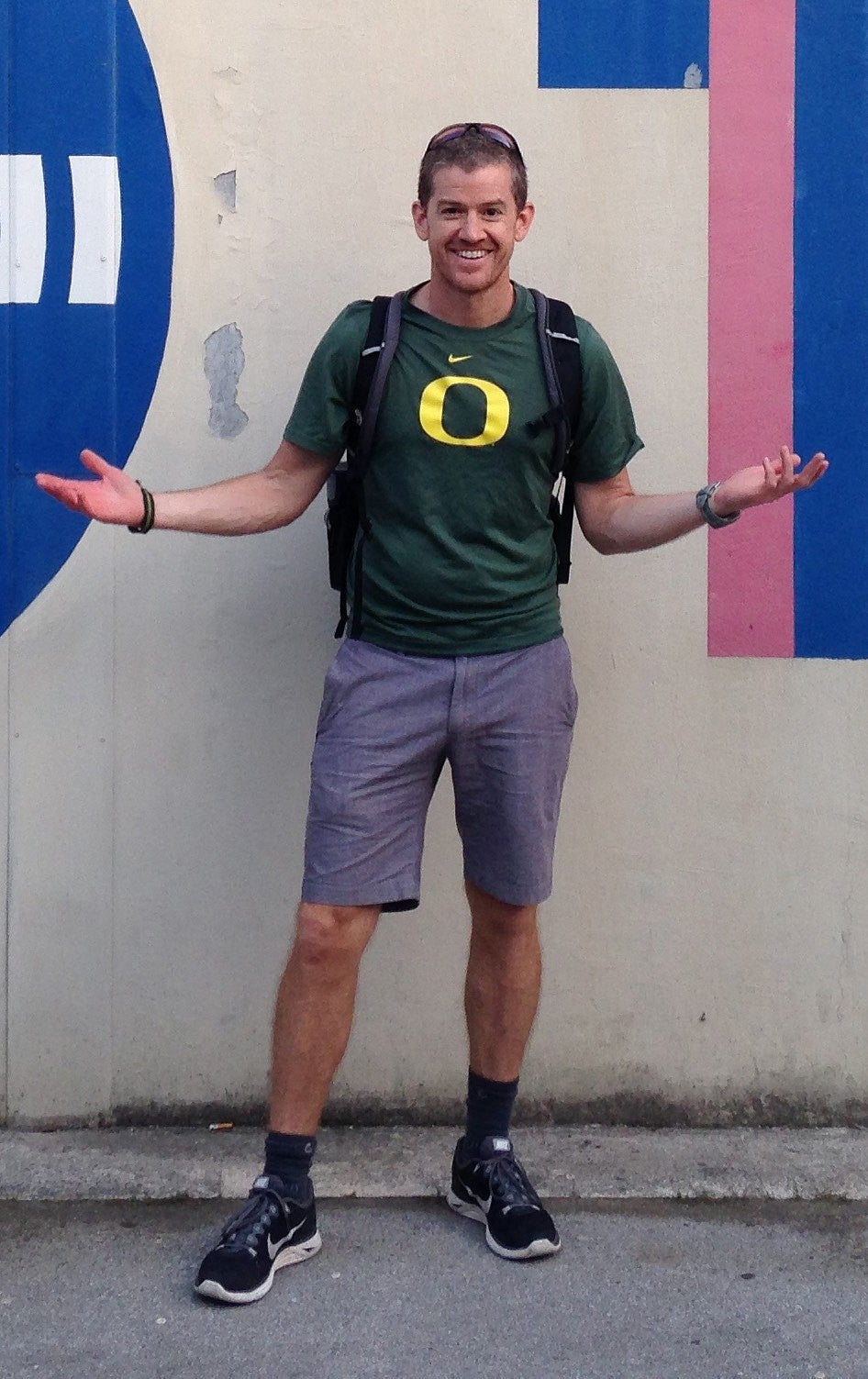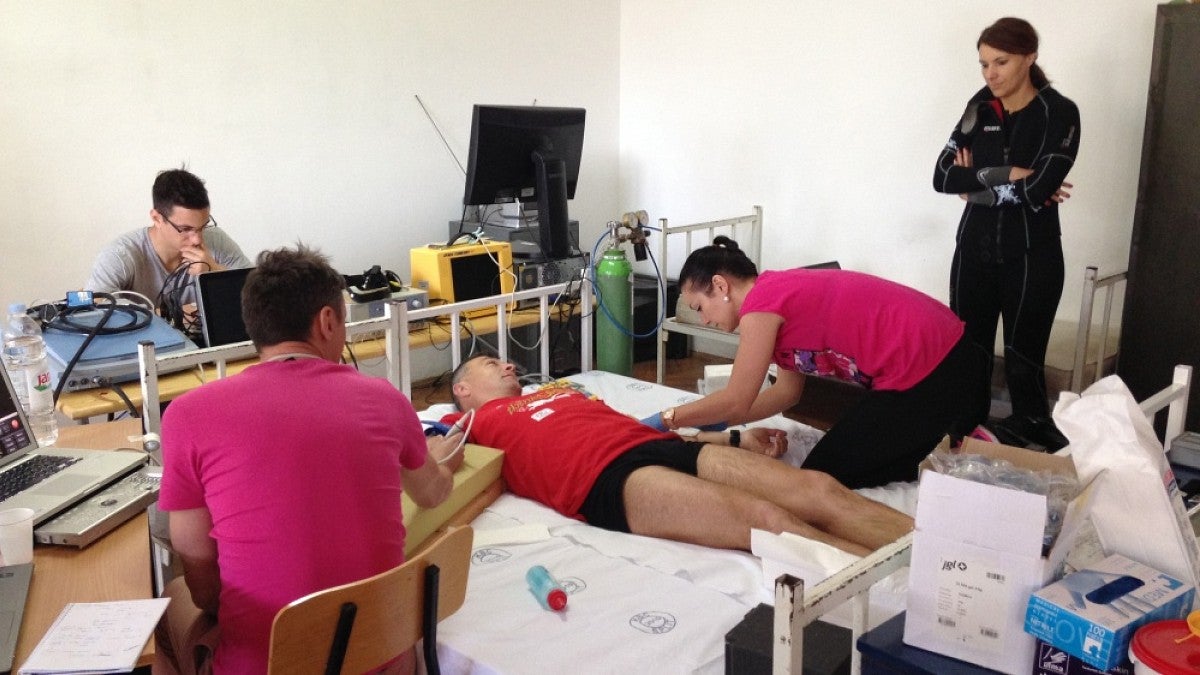Elite Croatian free divers who willingly deprive themselves of oxygen for minutes on end may help a team of researchers better understand respiratory disorders.
Studying a group of so-called “breath-hold divers” who practice their craft in the clear blue waters of the Adriatic Sea is just one aspect of a collaborative research project involving Andrew Lovering, a professor in the UO Department of Human Physiology. By examining the respiratory effects on apnea divers — another term for breath-hold or free divers — and scuba divers, Lovering and his Croatian collaborators hope to gain insight into the functional changes that accompany pulmonary hypertension.

His travel and living expenses will be covered through an approximately $30,000 research grant from the J. William Fulbright Foreign Scholarship Board. The Fulbright Program aims to increase mutual understanding between the U.S. and the people of other countries and establish open communication and long-term cooperative relationships.
“It’s fantastic to get these awards,” said Lovering, who has in the past conducted biomedical research in South America, China, Germany and also worked with the same Croatian research team that he will work with on his current project. “Research exchanges like this are great. It’s beneficial to me and beneficial to the host country. We bring expertise and knowledge into things that they might not have.
“It is also a real honor to represent the United States as a Fulbright Scholar, while getting to work with my outstanding Croatian colleagues and Croatian diving professionals.”
Lovering previously traveled to Bolivia in 2012 to set up a mountaintop lab, where he conducted human performance studies in a high-altitude setting to gain a better understanding of a minor heart condition. For his Croatian project, he will be conducting research in Split, a coastal city with a mountain backdrop that lies on the eastern shore of the Adriatic Sea. He will be conducting intensive, three-month visits in the summers of 2019 and 2020.
A common desired outcome of both research projects is gaining a better understanding of the effects a lack of oxygen has on human performance to shed light on human health and disease. Low oxygen is a threat in many lung and heart diseases and is a driver for growth in some types of cancer.
In addition to studying apnea divers, Lovering and his collaborators will also be examining scuba divers. The project grew out of a puzzling discovery that some scuba divers were experiencing post-dive increases in pulmonary artery pressure that were not triggered by low oxygen.
“It was kind of an odd thing because usually increases in (pulmonary) pressure are caused by low oxygen or hypoxia and there’s no reason anybody who is scuba diving should be hypoxic,” Lovering said.
A central focus of the Croatian study will be intrapulmonary arteriovenous anastomoses, which are large diameter pathways that exist within the lungs and are associated with pulmonary pressure during exercise. Higher blood flow through the pathways is associated with lower pulmonary pressure during exercise and lower blood flow is associated with higher pulmonary pressure, Lovering said.
Researchers will also be considering a heart feature known as a patent foramen ovale, a small hole that exists in one third of the population and that Lovering’s research has demonstrated to have a limiting effect on human physiology at high altitude. The two features are associated with pulmonary arterial pressure in low oxygen conditions and with exercise, but researchers have not established whether or not the heart feature is associated with pulmonary pressure changes in apnea and scuba divers.
To better understand how the pulmonary pathways are associated with pulmonary hypertension, researchers will give divers the active ingredient contained in Viagra or a placebo. The compound, sildenafil, serves to reduce blood pressure in the lungs.
Lovering’s collaborators include Zeljko Dujic, a professor at the University of Split School of Medicine who studies the respiratory effects of scuba and apnea diving, and Vedrana Cikes Culic, a biochemist at the same institution who studies inflammation in cardiovascular disease.
Having traveled to Croatia in 2014, Lovering was eager to return to the geographically diverse country, which is located on the northwestern part of the Balkan Peninsula.
“I love working in foreign countries and meeting other people and learning about how things run in different places,” Lovering said “It’s a great cultural exchange and I can learn what people think about the U.S. and also show them that maybe not everything they see on TV is true. It’s fun and I feel very fortunate to get to do this stuff.”
—By Lewis Taylor, University Communications


